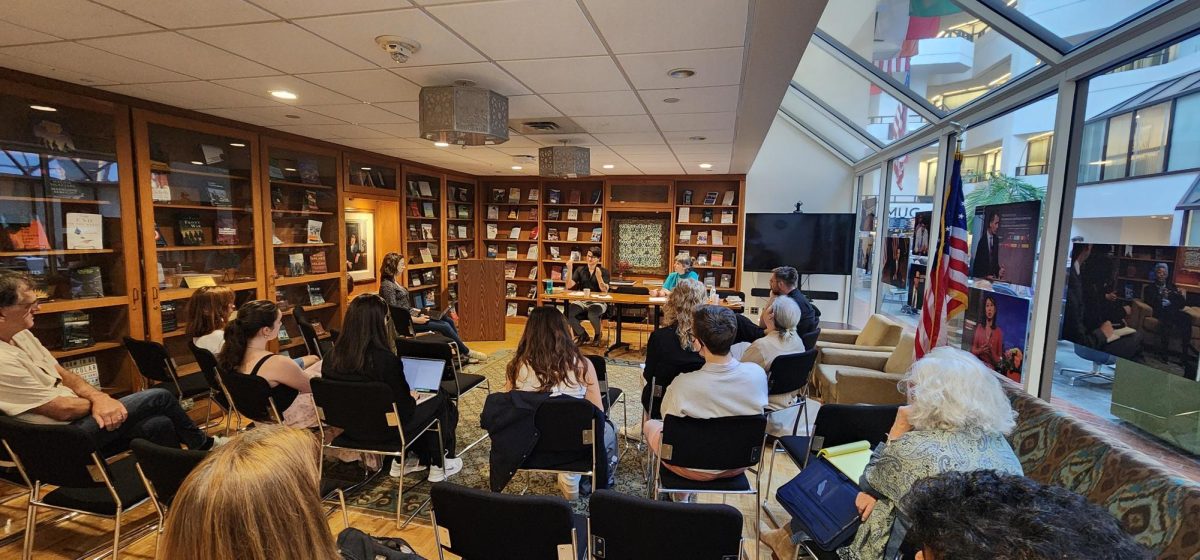
COURTESY BARBRA NAYIGA MUKUVE | Professors Joel Reynolds and Theodora Danylevich lead a talk discussing the interdisciplinary applications of disability studies Oct. 23.
Two Georgetown University professors discussed their writings on disability studies at an Oct. 23 event.
Joel Reynolds, director of the Disability Studies Program at Georgetown and an associate professor in the philosophy department, explored how definitions of disability are applied in various disciplines in his article “The Meaning of Ability and Disability.” Theodora Danylevich, a professor in the English department, studied the literary depiction of disability in her article “Disability Politics and Reproductive Critique in Gayl Jones’s Corregidora.” During the event, hosted by the Medical Humanities Initiative, both spoke on their personal expertise and the interdisciplinary nature of disability studies and medical humanities.
Reynolds emphasized the value of disability studies in bettering the lives of individuals and furthering a well-rounded understanding of studies in the humanities and social sciences.
“I increasingly think that the study of disability is foundational. Every field in the humanities and social sciences relies in some way upon the concept of ability and, thereby simultaneously, the concept of disability,” Reynolds wrote to The Hoya. “The sooner we realize this, the better we could make things for all people regardless of their (dis)ability status.”
Given that disability studies can inform a variety of disciplines, Reynolds said there is value in conducting interdisciplinary work in the disability studies field.
“These fields are interdisciplinary at their core, which is a boon,” Reynolds wrote. “Approaching things from multiple angles and methods is a more promising route to produce deep insights.”
Timothy Newfield, a professor in the history and biology departments at Georgetown and an organizer of the event, said the Medical Humanities Initiative seeks to bring multidimensional perspectives within the medical humanities discipline to students through its events.
“We really do aim to encourage cross-discipline dialogues at Georgetown through our Medical Humanities Initiative,” Newfield wrote to The Hoya. “Beyond simply being necessary in the field of study, I think it just makes things exciting and dynamic. It makes for more possibilities, more questions, and more answers.”
Newfield said he was pleased the initiative could highlight disability studies.
“This was our first conversation to focus specifically on disability and to have two awesome scholars working in disability studies contribute was fantastic — ideal really,” Newfield wrote.
Reynolds said he was excited to see the growth of interest in disability and medical humanities studies within the university.
“There is an explosion of interest in disability studies as well as in medical humanities across the college, graduate school and school of medicine at Georgetown University,” Reynolds wrote.
Students from a variety of majors and backgrounds attended the event and asked questions ranging from implications on the field of medicine to the intersection of anthropological study.
Charlotte Phillips (CAS ’28), a student attendee, said the event informed her of the myriad aspects of disability studies.
“I didn’t realize how many different disciplines disability studies touches,” Phillips told The Hoya. “It was interesting to see how professors from two different focuses could show how complex the topic is and the impact of framing the conversation from different questions.”
In addition to exploring how their work intersects, both professors reflected on the personal impacts of their own work.
Reynolds said that seeing the vast differences between how disability has affected members of his family caused him to reconsider what the term “disability” means and write about it in “The Meaning of Ability and Disability.”
“What it meant for my late brother to be disabled vs. what it means for my mother to be disabled (vs., for that matter, what it means for me to be disabled) is wildly, perhaps even categorically different,” Reynolds wrote. “Witnessing these differences — as well as how differently people treated them — led me to think that disability isn’t one sort of thing.”
Reynolds suggested that the conversation around disability should shift to examine the term’s impact on different communities.
“While in some domains like law, we have to define disability, I think that searching for an all-encompassing definition is misguided,” Reynolds said. “We need instead to look at what the concept does in the world. How do we tend to use it and what work does its use do for us in specific contexts?”